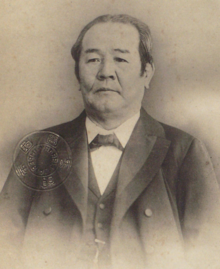
Back شيبوساوا ايكى ARZ Сібусава Эіці Byelorussian Shibusawa Eiichi German Eiichi Shibusawa Spanish شیبوساوا ایچی Persian Shibusawa Eiichi French Shibusawa Eiichi ID 渋沢栄一 Japanese 시부사와 에이이치 Korean Shibusawa Eiichi Dutch
Shibusawa Eiichi | |
|---|---|
渋沢 栄一 | |
 | |
| Born | March 16, 1840 Chiaraijima, Hanzawa district, Musashi Province, Tokugawa Shogunate (now Fukaya, Saitama Prefecture) |
| Died | November 11, 1931 (aged 91) Motonishigahara, Takinogawa Ward, Kitatoshima District, Tokyo, Empire of Japan (now Nishigahara, Kita Ward, Tokyo) |
| Occupations |
|
| Spouses | |
| Children | Tokuji Shibusawa, Masao Shibusawa |
| Honours | Grand Cordon of the Order of the Sacred Treasure 4th Class Grand Order of the Order of the Rising Sun with Pauwlonia Flowers |

Shibusawa Eiichi, 1st Viscount Shibusawa (渋沢 栄一, March 16, 1840 – November 11, 1931) was a Japanese industrialist widely known today as the "father of Japanese capitalism", having introduced Western capitalism to Japan after the Meiji Restoration. He introduced many economic reforms including use of double-entry accounting, joint-stock corporations and modern note-issuing banks.[2]
He founded the first modern bank based on joint stock ownership in Japan. The bank was aptly named The First National Bank (Dai Ichi Kokuritsu Ginkō, now merged into Mizuho Bank) and had the power to issue its own notes. Through this bank, he founded hundreds of other joint stock corporations in Japan. Many of these companies still survive to this day as quoted companies in the Tokyo Stock Exchange, which Shibusawa also founded. The Japanese Chamber of Commerce and Industry was founded by him as well. He was also involved in the foundation of many hospitals, schools, universities (including the first women's university), the Imperial Hotel in Tokyo and charitable organizations including the Japan Red Cross.[2]
Another notable aspect of Shibusawa's career is that, despite being the founder of hundreds of corporations, he refused to maintain a controlling stake in these corporations, effectively preventing himself from forming a zaibatsu. What is known as the Shibusawa zaibatsu was a holding company to look after his estate for his family. The Shibusawa Zaibatsu did not hold any controlling stake in any companies. Despite his humble origin as a farmer, he was granted the title of Viscount, while all other zaibatsu founders were awarded the title of Baron. He was also awarded Shōnii, Second Honour under the ritsuryō rank system, which is usually given to high-ranking nobility and prime ministers.
Shibusawa is featured on the 10,000 Japanese yen note, one of the new designs that went into circulation on 3 July 2024.[3] Shibusawa was also printed on bank notes issued by the Korea First Bank, which he owned, in 1902.[4][5] The choice of Shibusawa has previously been criticised in the Republic of Korea.[6][7]
- ^ a b "Chronography of the life of Shibusawa Eiichi". Retrieved 2024-01-30.
- ^ a b Odagiri, Hiroyuki (1996). Technology and Industrial Development in Japan. Oxford University Press. pp. 72–73. ISBN 978-0-19-828802-2.
- ^ "Japan to launch new banknotes on July 3, 1st design change in 20 years". Kyodo News. 30 June 2024. Retrieved 4 July 2024.
- ^ "The Liberation Association, a group of descendants of independence fighters, expressed regret over t.. - MK". 매일경제. 1 July 2024. Retrieved 4 July 2024.
- ^ "韓国の抗日団体、渋沢栄一の新一万円札に抗議「日帝植民地経済収奪の尖兵」「欺瞞的行為」". The Sankei Shimbun (in Japanese). 2 July 2024. Retrieved 11 July 2024.
- ^ "Japan's New Bank Notes Draw Criticism from South Korea". Asia Pacific Foundation of Canada. 18 April 2019. Retrieved 11 July 2024.
- ^ "New Japanese Banknote to Feature Image of Controversial Figure". world.kbs.co.kr. 9 April 2019. Retrieved 11 July 2024.
© MMXXIII Rich X Search. We shall prevail. All rights reserved. Rich X Search